Tag Archive: presume competence
September 8, 2014
by Carole Zangari -
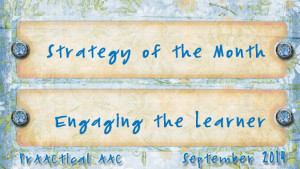
Summer is over in our part of the world and that means we get the opportunity to work with a whole new crop of students and clients. There is so much for beginning clinicians to know about providing AAC services that it is intimidating at best and overwhelming in most cases. In previous posts we’ve written about expectations, goal-setting, intervention strategies, therapy activities, reinforcement, feedback, and the like. This month, we’ll focus on a construct that permeates everything: engagement We all know what it looks and feels like when a client is engaged, but how do we make that happen? Here are some thoughts. 1. Start by presuming that your client is a learner on his/her way to developing competence. Good intervention, consistent language models, the right tools, and plenty of practice will move them along the journey toward improved communication. It’s important that, as clinicians, we truly believe that.... [Read More...]
Filed under: Strategy of the Month
Tagged With: engagement, intervention, presume competence
April 7, 2014
by Carole Zangari -

Filed under: PrAACtical Thinking
Tagged With: Cheryl Jorgensen, least dangerous assumption, presume competence
January 29, 2014
by Robin Parker -

More evidence for presuming competence. http://youtu.be/u2HD57z4F8E
Filed under: PrAACtical Thinking
Tagged With: Hearing, Insprational, presume competence
October 28, 2013
by Robin Parker -
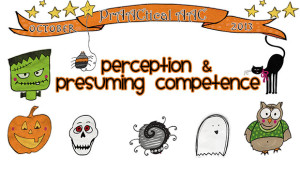
A Few Great Posts From Around the Web to Illustrate This: His Body Does His Feelings by A Diary of A Mom We Knew She Understood but Now We Know She Minds by Living with Rett Syndrome Yellow- Living with Rett Syndrome Life with Lief: We are Different But Same by Sunshine Bodey Perception Drives Everything – Uncommon Sense Share your stories of perception and competence.
Filed under: PrAACtical Thinking
Tagged With: presume competence
September 20, 2013
by Robin Parker -
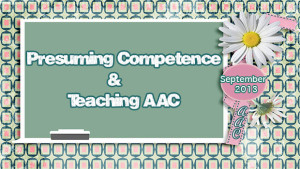
We have said this before, we say it now, and we will say it again because time and time again we are surprised in great ways. Aided Language Input Talk About Relevant Topics Talk About Age-Appropriate Topics Use Language Facilitation Techniques And….Listen to the Message, Be a Communication Partner, Have Fun!
Filed under: PrAACtical Thinking
Tagged With: aided language input, Language facilitation strategies, presume competence
June 25, 2013
by Robin Parker -
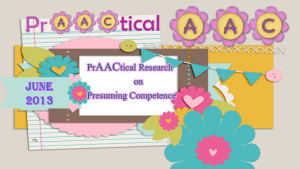
We love PrAACtical research that involves intervention that presumes competence. In this post, we bring you an article by Drs. Anne Emerson and Jackie Dearden on how adopting a ‘full’ language approach and presuming competence can result in increased understanding of complex language and literacy skills. (Emerson & Dearden, 2013). They discuss the role of adopting a ‘minimal’ vs ‘full’ language teaching approach. Checkout the Sage Journals online abstract here: The effect of using ‘full’ language when working with a child with autism: Adopting the ‘least dangerous assumption’ Emerson, A., & Dearden, J. (2013). The effect of using ‘full’ language when working with a child with autism: Adoptingthe ‘least dangerous assumption. Child Language Teaching & Therapy, 29(2), 233-244. doi: 10.1177/0265659012463370
Filed under: PrAACtical Thinking
Tagged With: presume competence, research
May 26, 2013
by Carole Zangari -
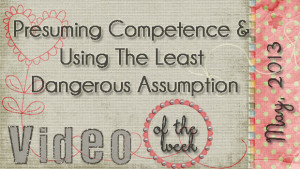
One of our core language posts from last month referred to the criterion of the least dangerous assumption (Donellan, 1984). This week we’re pleased to be able to expand on that topic and share a video by Dr. Cheryl Jorgensen, a former project director at the Institute on Disability at the University of New Hampshire. As we near the end of a school year in the US and begin IEPs that will direct the activities for the next academic year, we’re all reminded how critical it is to set high but attainable goals. Sometimes, that means making the least dangerous assumption. You can view the video here. Donnellan, A. (1984). The criterion of the least dangerous assumption. Behavior Disorders, 9, 2, 141-150.
Filed under: Video of the Week
Tagged With: Cheryl Jorgensen, expectations, goal setting, least dangerous assumption. Anne Donellan, presume competence






